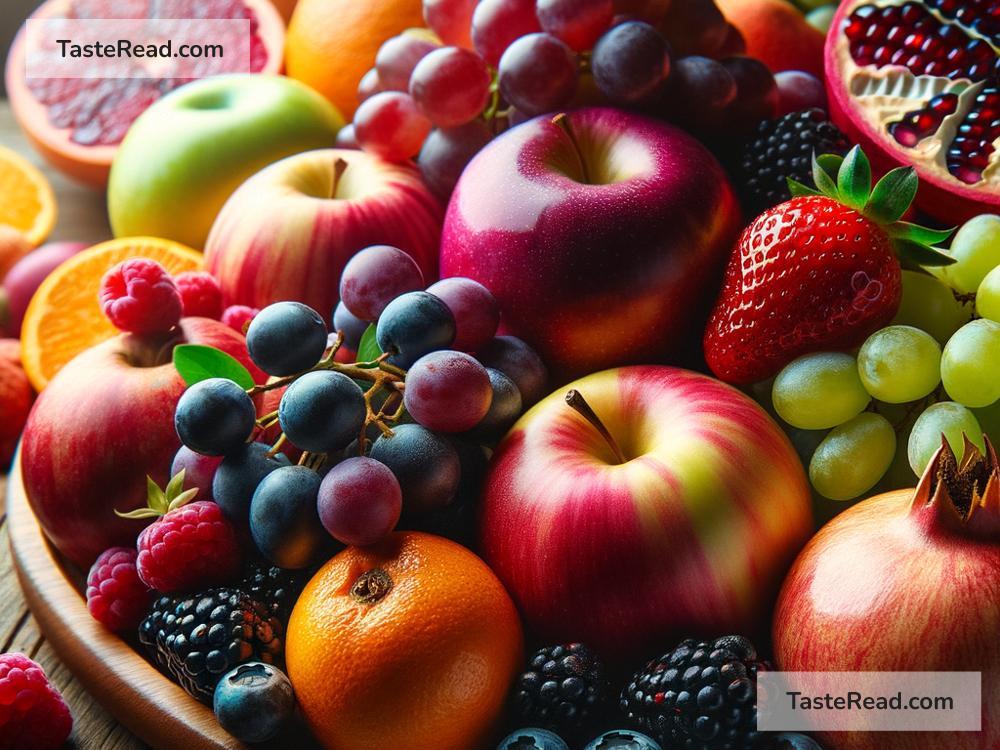The Role of Polyphenols in Fruit Taste
When you bite into a crisp apple, a juicy orange, or a sweet strawberry, you’re experiencing a blend of flavors that make fruits so enjoyable. While sugar often takes center stage in discussions about fruit sweetness, there’s another group of compounds that play an important role in how fruits taste—polyphenols. These natural substances not only affect the flavor but also have health benefits. Let’s dive into the world of polyphenols and explore how they shape the taste of fruits.
What are Polyphenols?
Polyphenols are natural chemicals found in plants. They’re known for their antioxidant properties, which means they help protect plants—and you—from damage caused by harmful molecules called free radicals. Fruits, vegetables, tea, coffee, and even wine are rich in polyphenols.
Most importantly, polyphenols influence how fruits taste. They contribute to sensations like bitterness, astringency (the dry or puckering feeling in your mouth), and sometimes the perception of sweetness.
How Polyphenols Shape Fruit Taste
Polyphenols might not be the first thing you think of when you imagine fruit flavor, but they play a behind-the-scenes role that affects your overall tasting experience:
-
Bitterness:
Some types of fruit contain polyphenols that add a bitter flavor. For example, the bitterness in grapefruit or some varieties of apple comes from specific types of polyphenols. While bitterness might seem less appealing than sweetness, it can balance a fruit’s flavor profile and make it more complex and interesting. -
Astringency:
Have you ever eaten an unripe banana or persimmon and felt your mouth dry out? That sensation is caused by polyphenols. Certain polyphenols bind to proteins in your saliva, which reduces its lubrication and creates the dry, puckering feeling known as astringency. This is why unripe fruits often taste unpleasant—they contain more polyphenols. As fruits ripen and their sugar content increases, the effects of polyphenols may be less noticeable. -
Sweetness and Enhancement:
Polyphenols can sometimes enhance the natural sweetness of fruits by interacting with other compounds in the fruit. They also contribute to the rich, layered flavor profiles found in fruits like berries and cherries. -
Complexity in Flavor:
Fruits like grapes, apples, and olives contain polyphenols that contribute to complex, deep flavors. These compounds make fruits taste less one-dimensional, adding notes of tartness, depth, and even a little sharpness. This complexity is one reason why certain fruits are prized for making wines or juices—they have a mix of sugars, acids, and polyphenols that create unique tastes.
Ripening and Polyphenols
The taste of fruit changes as it ripens, and polyphenols play a key role in this process. When fruits are unripe, they often contain higher amounts of polyphenols, which contribute to bitterness and astringency. As the fruit ripens, these compounds break down or become less prominent, resulting in a sweeter and milder taste.
For example, think about bananas. An unripe banana tastes starchy and almost chalky, while a ripe banana is sweet and creamy. This transformation happens because the polyphenols decrease, and the sugar content increases as the fruit matures.
Polyphenols and Color
Polyphenols don’t just influence taste—they also play a role in how fruits look. Many polyphenols are responsible for the vibrant colors of fruits, such as the deep red of cherries, the bright orange of tangerines, or the dark purple of plums. The brilliant colors serve a biological purpose by attracting animals and insects to help spread seeds, but they also make fruits more appealing to people.
Why Are Polyphenols Good for Your Health?
Beyond taste, polyphenols have health benefits that make them an important part of your diet. They act as antioxidants and help reduce inflammation, which can lower the risk of chronic diseases like heart disease, diabetes, and cancer.
Fruits such as berries, apples, and grapes contain high levels of polyphenols. These fruits not only delight your taste buds but also provide a natural boost for your body.
Balancing Sweetness and Bitterness
While polyphenols can make fruits taste bitter or astringent, they are an important part of what gives fruit its character. Without them, the flavor of many fruits would be flat and overly sweet. The balance between sweetness (from natural sugars) and bitterness or tartness (from acids and polyphenols) is what makes fruit taste refreshing and satisfying.
Think about oranges—if you’ve ever tasted a super-sweet orange without any tanginess, it probably wasn’t as enjoyable as an orange with just the right balance of sweet and sour flavors. Polyphenols play a key role in maintaining that balance.
A Natural Miracle
Polyphenols are a wonderful example of the complexity and magic of nature. They shape the taste of fruits, give them beautiful colors, and even protect our health. The next time you enjoy a piece of fruit, take a moment to appreciate the work of these tiny but powerful compounds.
Fruits are not just a source of sweetness—they’re a combination of chemicals, flavors, and sensations that nature has perfected. And polyphenols are at the heart of it all, making each bite a unique, flavorful experience while offering benefits that go far beyond taste.
Enjoy your fruits, and savor the science behind their amazing flavors!


